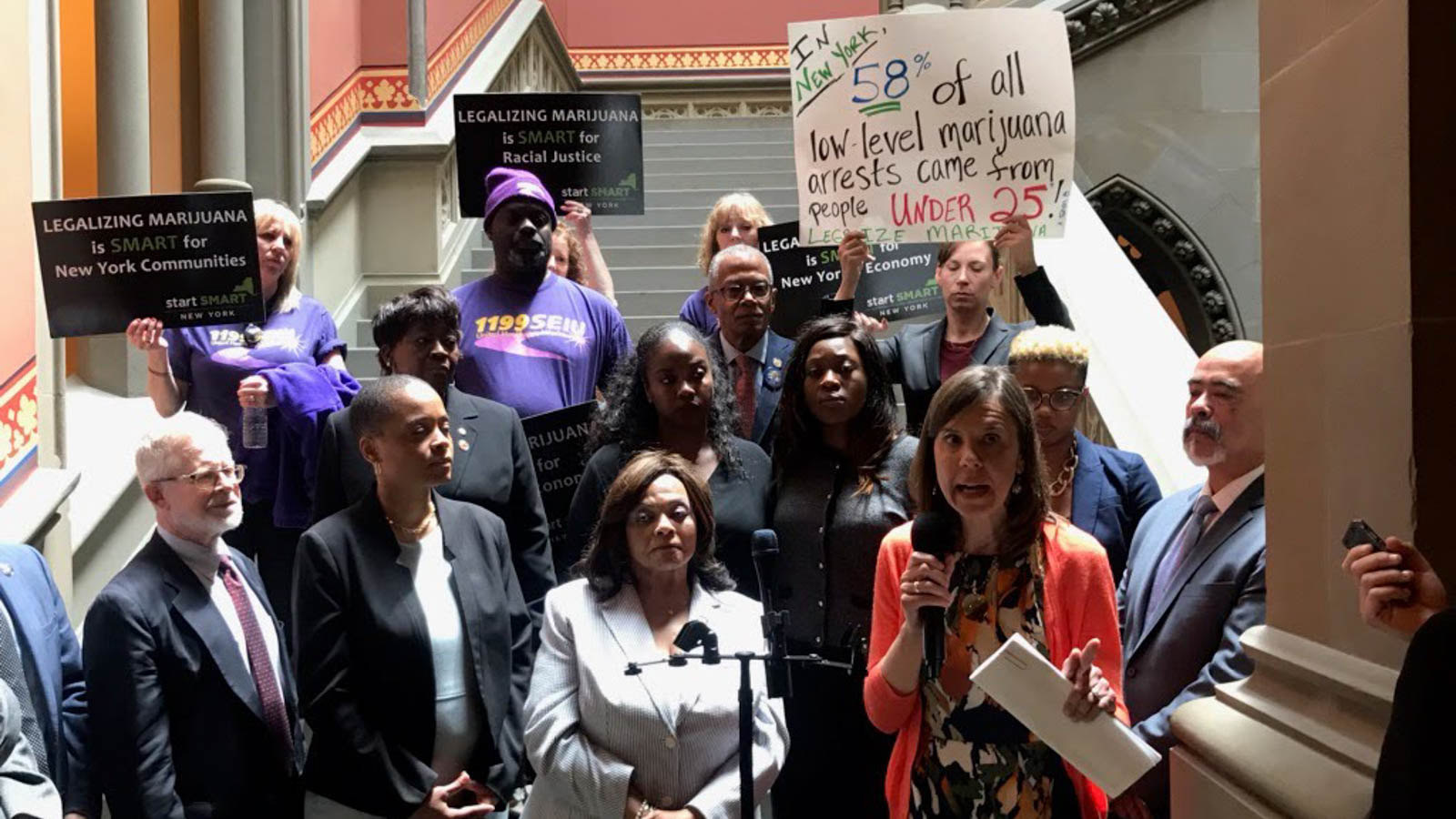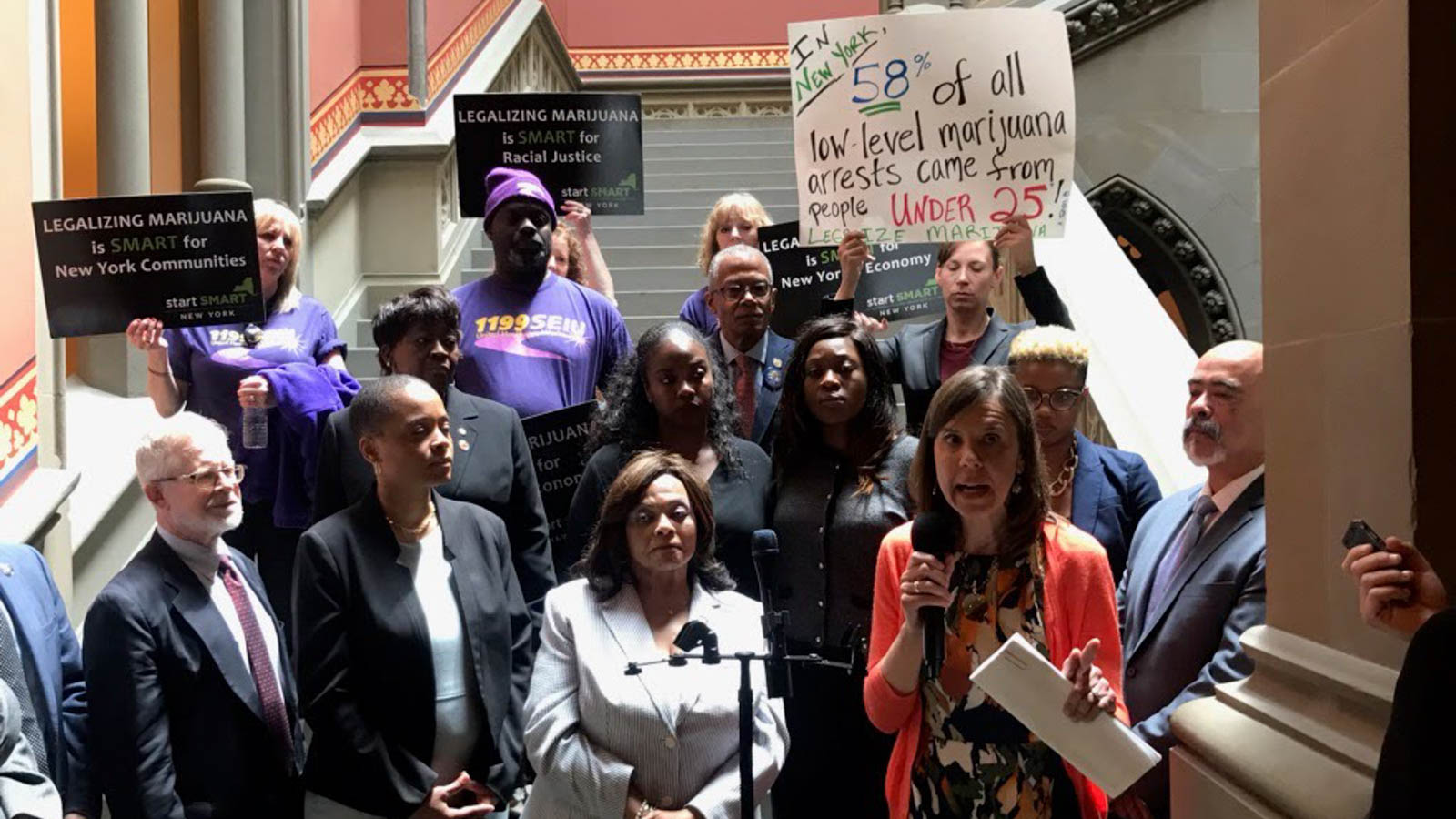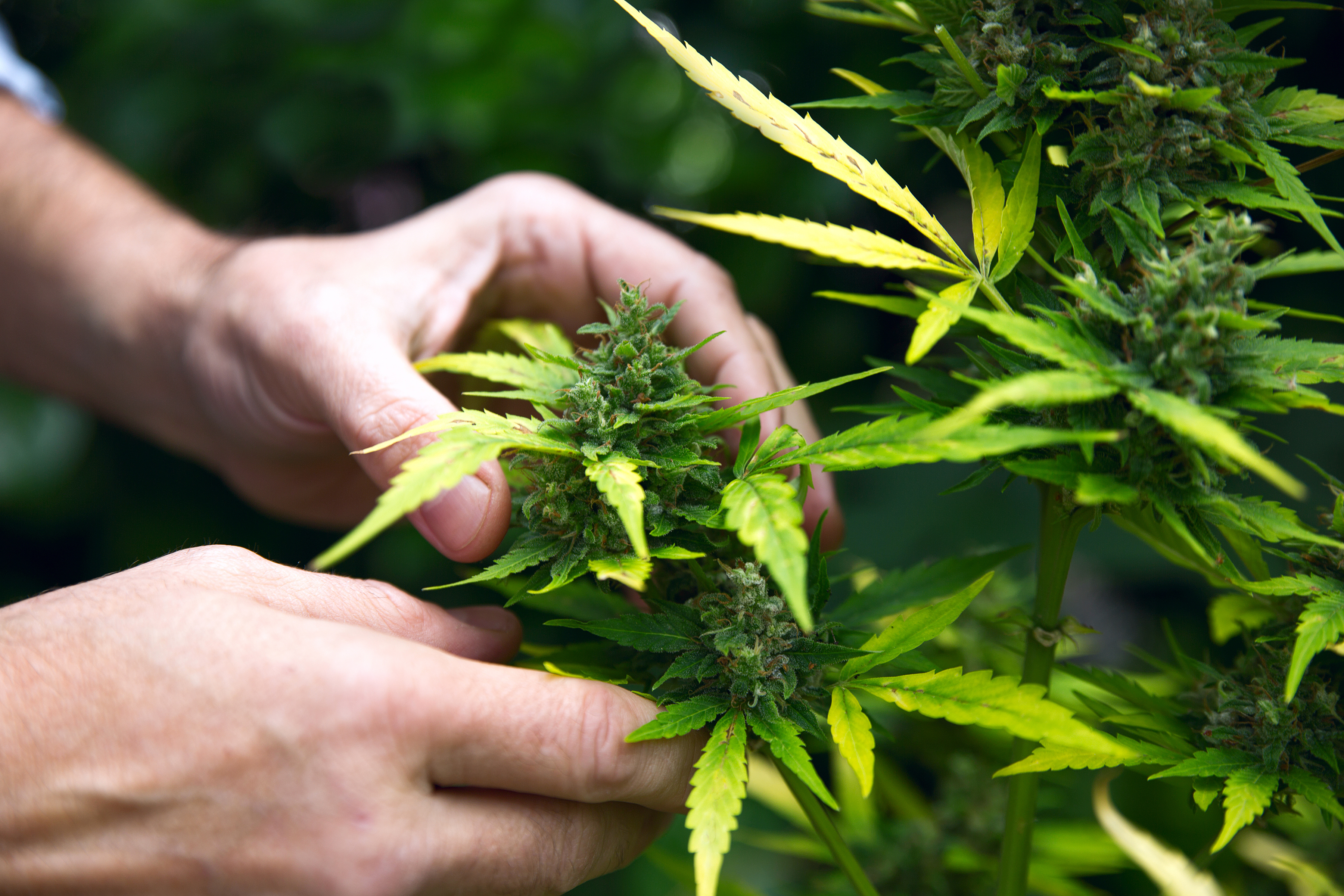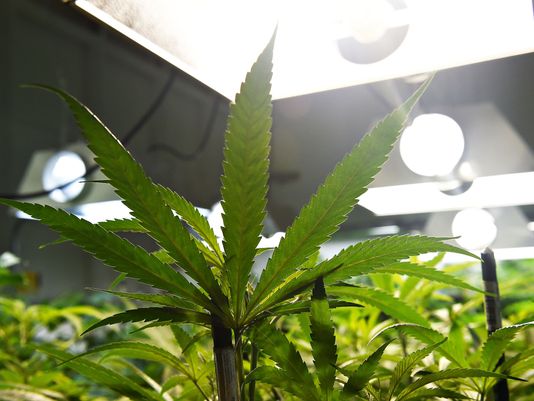
Labor leaders joined advocates and elected officials in the New York state Capitol in Albany on May 21, 2019, to advocate for marijuana reform.
At a noon press conference at the foot of the landmark known as the Million Dollar Staircase inside the Capitol, union leaders were among those advocating for the Marijuana Regulation and Taxation Act (MRTA).
Members of the Service Employees International Union (SEIU) Local 1199, representing hundreds of thousands of health care workers, and United Auto Workers (UAW) Region 9A came out in favor of the bills, S1527 in the Senate and A1617 in the Assembly.
“If there’s a social justice fight, the United Auto Workers are there. But this is particularly important to so many of us throughout the UAW. This is what we have been rallying about in the streets for decades. This is what we have been trying to do together with the legislature. The time has come,” said Deborah Wright, the political director for UAW Region 9A.
She described the bill as important to all of the union’s members, but as particularly important to members of two locals under UAW, Local 2325, the Association of Legal Aid Attorneys and Local 2320, the National Organization of Legal Services Workers. She said she worked as a public defender for 20 years as a member of Local 2325, in which she said she saw the devastating effects of marijuana prohibition on communities of color.
The labor leaders joined New York Assembly members and members of the pro-legalization group Start SMART NY to advocate for the bill.
Changing New York’s laws on marijuana to create a taxed, legal market will have long-term benefits, said Democratic Assembly Majority Leader Crystal Peoples-Stokes. She added that other states that have allowed adult-use cannabis have done so by voter referendum. She said polling data show strong support for legalization in the Empire State.
“But there is not a referendum vote in New York State. It is up to us as legislators. We have to make that decision. And I believe that we will make the right decision before we close out this 2019 session,” she said. While New York voters can petition for a referendum on local ordinances, there is no system for voters to bring a vote to change the state Constitution.
Issues of social justice were at the center of the arguments at the event.
Gabby Seay, the political director for SEIU Local 1199, said she was there on behalf of 450,000 members from Massachusetts to Florida, including many in New York.
“They say we need to pass this bill right now,” she said.
According to Seay, the union local began in 1959 with the successful attempt to organize workers at a hospital in the Bronx. She said that organization succeeded because “We weren’t just fighting for better wages, we weren’t just fighting for better treatment of the workers. We were fighting for justice.”
She said the fight continues after 60 years.
“This is not about whether people can have a fun time at parties,” said Democratic Assembly member Richard Gottfried at the press conference. “This is about whether the law is going to continue to needlessly and pointlessly wreck the lives of thousands and thousands, if not tens of thousands, of young people, overwhelmingly people of color.”
Gottfried said that has happened for generations.
“It’s time to put a stop to it,” he said. “We’re going to do our darndest in the next couple of weeks to make sure that this bill can come together and be passed by both houses and be signed by the governor.”
Democratic Assembly member Taylor Raynor said some of her constituents have concerns about the bill, but she believes a regulated marijuana market is the best option.
“I have witnessed the effects of synthetic marijuana and marijuana laced with other substances and it is terrifying,” she said. “If people are going to continue utilizing marijuana, I feel our communities would be safer having a regulated product.”
She described marijuana legalization as a civil rights issue. Speakers cited the disproportionate impact of marijuana enforcement on communities of color, arguing that responsible regulation of marijuana would improve public health, community well-being and equity in New York.
“When you look at who is being arrested for marijuana possession, it is largely black and brown folks across this state and across this country. We can no longer turn a blind eye to this very important civil rights and human rights issue,” Seay said.
Seay added that there already is an unregulated marijuana market in the state, which means consumers do not have protections, and added that the proposed bill could bring badly needed tax revenue to the state.
As proposed, the Marijuana Regulation and Taxation Act would legalize the production, distribution, and use of marijuana and establish a system for marijuana similar to the way alcohol and tobacco are regulated in New York.
Members of Start SMART NY argue that enforcement of marijuana laws have eroded community trust in law enforcement. The bill would create a process to reclassify past marijuana convictions and to resentence those currently serving time on a marijuana-related conviction.
The bill would also create a regulated marijuana market. According to Start SMART NY, it would be modeled on tobacco and alcohol regulation but also respond to the lessons learned in other states that already allow adult use.
Democratic Gov. Andrew Cuomo supports legalization, but he dropped the issue from the state budget vote in March 2019, when it became clear it did not have the votes to pass. He indicated an adult-use measure would be approved by June 2019. According to information released in support of the press conference, the Marijuana Regulation and Taxation Act has been revised in advance of reintroduction to include recommendations from Cuomo and to address concerns raised by legislators.
The revised bill would regulate all aspects of cannabis, including medical marijuana, hemp products such as cannabidiol (CBD), and others, all under a single agency.
If approved, the bill would also clear cannabis-related criminal records, impose advertising restrictions, direct tax revenue to repair some of the damage done through prohibition and encourage small businesses in the new industry.
In New York, possession of a small amount of marijuana has been decriminalized for years. A first offense charge with less than 25 grams, or less than 1 ounce, means a $100 fine, similar to many traffic tickets. But possession of larger amounts remains a serious offense, with possession of between 8 ounces and 1 pound (227-454 grams) rising to the level of a felony with the possibility of four years in prison.
Feature image: Members of the New York legislature join labor leaders from the UAW and the SEIU at a May 21, 2019, press conference in Albany, N.Y., to voice support for bills that will create a legal, regulated cannabis market and also address social justice issues. (Photos by Jerónimo Saldaña/LatinoJustice PRLDF.)















